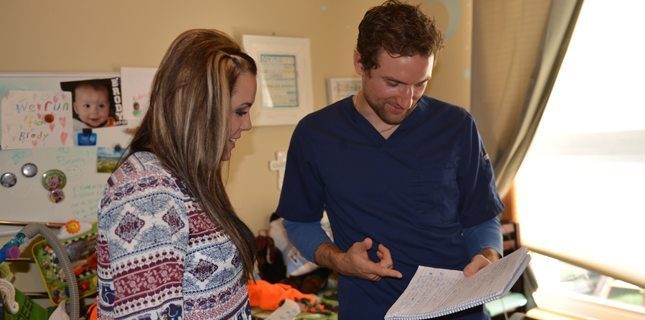Coming Home With Care: What to Consider When Preparing for a Hospital Discharge

In a three-part series, we’re exploring what can be an exciting but confusing time for parents of children with new medical diagnoses – preparing for discharge from the hospital to receive care from a home care company. But with the right resources, parents can feel confident as they make this monumental transition back to their own space.
In part 1 of the series, we discussed helpful steps in determining who will provide your child’s medical care, and now will get tips from our clinicians on how to prepare for hospital discharge. Stay tuned for tips for getting settled in at home!
Life becomes a bit of a whirlwind when preparing to leave the hospital with a child who has complex medical needs. To help alleviate some of that pre-discharge stress, we met with PHS Medical Director, Dr. Roy Maynard and PHS family mom and infusion nurse educator, Jill Wall, RN, BSN, CRNI, and also got input from the entire clinical team to compile a list of tips for families to consider.
Once the process is in place for a patient to leave the hospital and they are stable and ready to go, things can move quickly. The tips below will help get you organized and ensure you have necessary information from the hospital staff before you leave, making the trip home more seamless and the celebration of this incredible milestone.
1. Put all contact info on one piece of paper
Ask the hospital for one single piece of paper that has the contact information for your primary care doctor and all the different specialists who will be following your child after discharge, and when to call them. The hospital may give you individual cards, but a single sheet with all relevant contact information is much handier.
2. Interview to find a good fit
Interview both a DME company and nursing agency before making selections. Find a company you feel comfortable working with. If you know your child is chronically ill and will need long-term nursing care, be sure to ask the agency if they will stay with you over the long term.
3. Train family/friends that will care for the child
Encourage family members and friends to go through hospital training (or a PHS education course) to provide suitable backup when needed. Better yet, identify key people who will be in the home consistently staying up-to-date on the care your child needs and how to administer each care.
4. Organize vaccinations
Make sure any necessary vaccinations are up-to-date before going home and ask for a copy of the schedule to keep in your personal records.
5. Understand your coverage
Learn to work within insurance limits or find other payment options. At-home insurance coverage will be different than in the hospital and there will likely be extra expenses not covered by insurance. Contact your insurance provider before discharge for specifics about in-home care for your plan.
6. Learn as much as you can while in hospital
Build your confidence by spending as much time as possible, including overnights, with “care by parent” under hospital staff guidance at the hospital.
7. Get as much sleep as possible the night before hospital discharge
Although we mention spending overnights at the hospital in the point above, try to go home early the night before discharge and get a full, restful night’s sleep. Your child is safe in the hospital for one night and you will need and appreciate that uninterrupted night after bringing your child home.
8. Adjust medication schedules to home schedule
If the doctor has not suggested it already, ask if medication/feeding schedules can be safely rearranged to simplify the workload at home (for example, could an infant on electrolyte supplementation go from 4x/day to 3x/day or 2x/day?). While still in the hospital ask to adjust the schedules to the way it will be done at home at least one week before discharge. This will give you and your child time to acclimate.
9. Have your home set up prior to discharge
PHS helps families with high-tech patients sort through equipment and supplies so that you don’t come home to boxes full of unfamiliar products. We’ll cover this topic in the last of our series on discharging to home!
10. Remember you always have a team of support behind you
PHS and the hospital staff are always there to help you through the process of transitioning to home and beyond – we have clinicians on call day and night, and are always available to walk you through questions or concerns with cares or equipment.
Do you have any other tips or thoughts that you’d like to add to the list? We know the families who have already been through the process are the real experts and we’d love to hear from you!
Originally published: July 11, 2017


